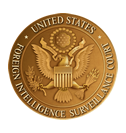
The United States Foreign Intelligence Surveillance Court (FISC), also called the FISA Court, is a U.S. federal court established under the Foreign Intelligence Surveillance Act of 1978 (FISA) to oversee requests for surveillance warrants against foreign spies inside the United States by federal law enforcement and intelligence agencies.

The Foreign Intelligence Surveillance Act of 1978 is a United States federal law that establishes procedures for the surveillance and collection of foreign intelligence on domestic soil.

The United States Foreign Intelligence Surveillance Court of Review (FISCR) is a U.S. federal court whose sole purpose is to review denials of applications for electronic surveillance warrants by the United States Foreign Intelligence Surveillance Court. The FISCR was established by the Foreign Intelligence Surveillance Act of 1978 and consists of a panel of three judges. Like the FISC, the FISCR is not an adversarial court; rather, the only party to the court is the federal government, although other parties may submit briefs as amici curiae if they are made aware of the proceedings. Papers are filed and proceedings are held in secret. Records of the proceedings are kept classified, though copies of the proceedings with sensitive information redacted are very occasionally made public. The government may appeal decisions of the FISCR to the Supreme Court of the United States, which hears appeals on a discretionary basis.

NSA warrantless surveillance — also commonly referred to as "warrantless-wiretapping" or "-wiretaps" — was the surveillance of persons within the United States, including U.S. citizens, during the collection of notionally foreign intelligence by the National Security Agency (NSA) as part of the Terrorist Surveillance Program. In late 2001, the NSA was authorized to monitor, without obtaining a FISA warrant, phone calls, Internet activities, text messages and other forms of communication involving any party believed by the NSA to be outside the U.S., even if the other end of the communication lays within the U.S.
In re: Sealed Case No. 02-001, 310 F.3d 717 (2002), is a per curiam decision by the United States Foreign Intelligence Surveillance Court of Review in which it reviewed restrictions that were placed upon a Foreign Intelligence Surveillance Act (FISA) application by the Foreign Intelligence Surveillance Court (FISC) on May 17, 2002. The Court of Review reversed the FISC's restrictions by stating that they "are not required by FISA or the Constitution." The opinion represents the first meeting of and first opinion by the Court of Review. For the purposes of review, the FISC's modification of the requested application worked as a "denial" and thus gave the Court of Review jurisdiction to take the case.

MAINWAY is a database maintained by the United States' National Security Agency (NSA) containing metadata for hundreds of billions of telephone calls made through the largest telephone carriers in the United States, including AT&T, Verizon, and T-Mobile.

Rosemary Mayers Collyer is an inactive Senior United States district judge of the United States District Court for the District of Columbia, and a former judge of the United States Foreign Intelligence Surveillance Court.

Claire Veronica Eagan is a senior United States district judge of the United States District Court for the Northern District of Oklahoma and a former Judge of the United States Foreign Intelligence Surveillance Court. Effective February 12, 2020, Chief Justice John G. Roberts appointed Judge Eagan as the chair of the Executive Committee of the Judicial Conference.

PRISM is a code name for a program under which the United States National Security Agency (NSA) collects internet communications from various U.S. internet companies. The program is also known by the SIGAD US-984XN. PRISM collects stored internet communications based on demands made to internet companies such as Google LLC and Apple under Section 702 of the FISA Amendments Act of 2008 to turn over any data that match court-approved search terms. Among other things, the NSA can use these PRISM requests to target communications that were encrypted when they traveled across the internet backbone, to focus on stored data that telecommunication filtering systems discarded earlier, and to get data that is easier to handle.

The practice of mass surveillance in the United States dates back to wartime monitoring and censorship of international communications from, to, or which passed through the United States. After the First and Second World Wars, mass surveillance continued throughout the Cold War period, via programs such as the Black Chamber and Project SHAMROCK. The formation and growth of federal law-enforcement and intelligence agencies such as the FBI, CIA, and NSA institutionalized surveillance used to also silence political dissent, as evidenced by COINTELPRO projects which targeted various organizations and individuals. During the Civil Rights Movement era, many individuals put under surveillance orders were first labelled as integrationists, then deemed subversive, and sometimes suspected to be supportive of the communist model of the United States' rival at the time, the Soviet Union. Other targeted individuals and groups included Native American activists, African American and Chicano liberation movement activists, and anti-war protesters.

Global mass surveillance can be defined as the mass surveillance of entire populations across national borders.
The Fourth Amendment Protection Acts, are a collection of state legislation aimed at withdrawing state support for bulk data (metadata) collection and ban the use of warrant-less data in state courts. They are proposed nullification laws that, if enacted as law, would prohibit the state governments from co-operating with the National Security Agency, whose mass surveillance efforts are seen as unconstitutional by the proposals' proponents. Specific examples include the Kansas Fourth Amendment Preservation and Protection Act and the Arizona Fourth Amendment Protection Act. The original proposals were made in 2013 and 2014 by legislators in the American states of Utah, Washington, Arizona, Kansas, Missouri, Oklahoma and California. Some of the bills would require a warrant before information could be released, whereas others would forbid state universities from doing NSA research or hosting NSA recruiters, or prevent the provision of services such as water to NSA facilities.

The USA Freedom Act is a U.S. law enacted on June 2, 2015, that restored and modified several provisions of the Patriot Act, which had expired the day before. The act imposes some new limits on the bulk collection of telecommunication metadata on U.S. citizens by American intelligence agencies, including the National Security Agency. It also restores authorization for roving wiretaps and tracking lone wolf terrorists. The title of the act is a ten-letter backronym that stands for Uniting and Strengthening America by Fulfilling Rights and Ensuring Effective Discipline Over Monitoring Act of 2015.

Upstream collection is a term used by the National Security Agency (NSA) of the United States for intercepting telephone and Internet traffic from the Internet backbone, meaning major Internet cables and switches, both domestic and foreign. Besides the Upstream collection, NSA also gathers information from Internet communications through arrangements with Internet companies under the program codenamed PRISM. Both the Upstream programs and PRISM are part of the Special Source Operations (SSO) division, which is responsible for collection in cooperation with corporate partners.

The FISA Improvements Act is a proposed act by Senator Dianne Feinstein, Chair of the Senate Intelligence Committee. Prompted by the disclosure of NSA surveillance by Edward Snowden, it would establish the surveillance program as legal, but impose some limitations on availability of the data. Opponents say the bill would codify warrantless access to many communications of American citizens for use by domestic law enforcement.

Proposed reforms of mass surveillance by the United States are a collection of diverse proposals offered in response to the Global surveillance disclosures of 2013.

Klayman v. Obama, 957 F.Supp.2d 1, was a decision by the United States District Court for District of Columbia finding that the National Security Agency's (NSA) bulk phone metadata collection program was unconstitutional under the Fourth Amendment. The ruling was later overturned on jurisdictional grounds, leaving the constitutional implications of NSA surveillance unaddressed.

Former U.S. President Barack Obama favored some levels of mass surveillance. He has received some widespread criticism from detractors as a result. Due to his support of certain government surveillance, some critics have said his support violated acceptable privacy rights, while others dispute or attempt to provide justification for the expansion of surveillance initiatives under his administration.
In Re Electronic Privacy Information Center, 134 S.Ct. 638 (2013), was a direct petition to the Supreme Court of the United States regarding the National Security Agency's (NSA) telephony metadata collection program. On July 8, 2013, the Electronic Privacy Information Center (EPIC) filed a petition for a writ of mandamus and prohibition, or a writ of certiorari, to vacate an order of the Foreign Intelligence Surveillance Court (FISC) in which the court compelled Verizon to produce telephony metadata records from all of its subscribers' calls and deliver those records to the NSA. On November 18, 2013, the Supreme Court denied EPIC's petition.

The Apple–FBI encryption dispute concerns whether and to what extent courts in the United States can compel manufacturers to assist in unlocking cell phones whose data are cryptographically protected. There is much debate over public access to strong encryption.









